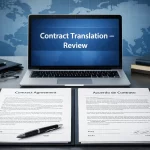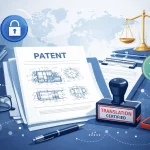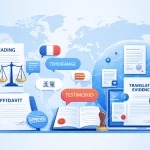Introduction to Google Translate
Google Translate is undoubtedly the most popular machine translation tool developed by Google. At its simplest, it translates language-based content from one language into another and allows people to think, write, and speak multiple languages.
This tool contributes in a large part to the modern translation of languages so that even though we speak different languages, we can all communicate and understand each other with the click of a button!
This is achieved through advanced algorithms, aided by more than a trillion of data, which corrects the polynomial input and provides accurate translations. Note that the translations are not perfect, though some guidance may be required to make them clearer.
How Google Translate Works
Google Translate is a smart tool that uses artificial intelligence to understand different languages and help people communicate.
Here’s how it works:
Language Detection: When you type or talk something into Google Translate, it first figures out which language you’re using. It makes use of special algorithms that study patterns within the phrases you have placed into.
Translation: Once it knows the language, Google Translate makes use of a big database of phrases and phrases to figure out what you are announcing. This is where artificial intelligence comes in. The AI learns from all the texts and translations it has seen before to make an exceptional guess at what you’re attempting to say.
Natural Language Processing: This is a fancy way of saying that Google Translate tries to understand human language like a person would. It appears in grammar guidelines, context, and commonplace phrases to make sure the interpretation makes sense.
Assessing the Accuracy of Google Translate Across Different Languages
The accuracy of Google Translate varies depending on which languages you use. For a few language pairs, like English to Spanish, it could be quite accurate. However, for others, mainly much less commonplace languages, the accuracy might not be as desirable.
One energy of Google Translate is that it is quick and clean to use. You can type in a sentence and get a translation almost instantly. This is helpful for primary expertise but might not be dependable for vital documents or conversations.
However, the accuracy of Google Translate isn’t the best. It can war with complicated sentences, idioms, and nuances unique to positive languages. For example, it might leave out cultural references or translate phrases too actually, which occasionally makes no experience.
Google Translate is smart artificial intelligence for getting the gist of any text in distinctive languages. However, it is only accurate sometimes, especially for complicated or much less common language pairs.
Comparing Google Translate to Professional Human Translators
There’s a big difference in relation to comparing Google Translate versus a human translator. Since it’s a powerful machine translator and can be helpful for basic translations, its translation accuracy can vary. On the other hand, expert human translators commonly offer better-quality translations.
One primary difference is in the information context. Human translators can grasp nuances and cultural references that Google Translate would possibly pass over.
For instance, Google Translate might struggle with idioms like “kick the bucket,” translating it literally instead of understanding its meaning of “to die.”
Grammar is another area of concern for Google Translate. That’s why it can make lots of errors in sentence structure or tense, which can lead to wrong translations.
Additionally, Google Translate won’t deal with specialized or technical terminology nicely. In expert fields like medical or law, accuracy is very crucial. That’s why human translators can make sure of the right terminology at this point.
When to Use Google Translate and When to Hire a Professional
We all know that Google Translate serves as a very handy tool for quick translations or casual conversations. Its power lies in handling straightforward texts with common language patterns. Yet, completely relying on Google Translate for crucial documents like legal contracts, business communications or even medical records could be a very risky task.
Here’s why:
Accuracy: Google Translate can misread nuances which leads to errors. These errors change the meanings entirely. This mistake may be a large trouble, especially when it comes to translating professional documents like legal or medical contexts.
Context and Tone: Professional translators recognize the context at the back of the textual content. They also make sure that the tone and message stay perfect. This is critical for conveying intentions appropriately, mainly in touchy subjects.
Cultural Nuances: Language is deeply knitted with culture. Google Translate might miss cultural subtleties and cause misunderstandings.
Reliability: Professional translators go through tough training and have knowledge in precise fields. They provide reliable translations backed by knowledge and enjoyment.
Confidentiality: Confidentiality is paramount in many sectors. Hiring a professional ensures that sensitive facts stay intact.
Conclusion
Google Translate is an entirely useful machine translation for translating various languages. It makes the conversation less complicated worldwide. However, it’s critical to not forget its barriers, together with accuracy problems and capability misunderstandings.
Users have to use it as a start line and double-test important translations for extra accuracy. Google Translate improved to provide more correct and nuanced translations through the years. Overall, it’s a valuable aid for quick translations but you should be using it very carefully.
Subtitles

Professional and Accurate Subtitle Services for your Videos.
- Video subtitles specifically tailor-made for improving accessibility.
- Using highly experienced subtitlers with years of industry experience.
- Professionally written and expertly timed.
Translation

We help the world’s top companies translate their content in over 73 languages!
- We localize content for internet websites, games, travel, cryptocurrencies, and more
- Expand your global audience by adding different languages.
- We work only with qualified translators and experienced content creators
Audio translation

Ensuring full accessibility for Blind and visual impaired audiences.
- Visual descriptive events as they occur in the video.
- Working with top audio describers to perfectly describe what is happening on-screen
- Professional sound recording.









